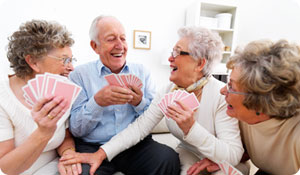
While some of your social circles will inevitably shrink as you get older, others can easily open up for you, if you stay open to new ideas.
- Volunteer at a local school, hospital, or community center.
- Attend lectures at libraries or wellness workshops at medical centers.
- Join a fitness center that encourages older memberships.
- Take a cooking class.
- Attend a continuing education class at a local college.
- Sign up for group tours of local areas you've never explored or senior bus trips to places you'd like to visit.
If you are reluctant to start something new, consider new ways to pursue old interests by involving others.
- Start or join a neighborhood knitting group, book club, or potluck lunch circuit.
- Find a movie buddy or someone to walk around the block with for light exercise and conversation.
You may be surprised to find how many others your age are also looking for companionship, but may not know where to start.
If you ever wonder why you should bother reaching out to make new friends or get involved in group activities, experts who study aging have some good answers for you.
In a study published in a 2008 issue of the American Journal of Public Health, researchers at the University of Michigan found that social interaction with family, friends, or through volunteer activities helps delay memory loss in older men and women. In this study, the memories of those with the least amount of social activity declined twice as fast as the memories of those who were socially active.
A Swedish study published in a 2009 issue of the Journal of Nutrition, Health and Aging found that men and women aged 65 and older who were often engaged in social activities reported feeling significantly better about their physical and mental health than those who were least engaged. They also reported feeling considerably less lonely.
Over a decade ago, Harvard researchers found that social activities such as
- going to church,
- eating out,
- playing cards,
- attending sports events,
- and volunteering in the community are as important to helping older people stay healthy and live longer as physical activities.
The best, they say, is to enjoy both physical and social activities and even find ways to combine the two, such as swimming with a friend. Just like younger people, older folks are more likely to stick with an activity if they find others to do it with them.
Sources:
Ertel, K; et al. "Effects of Social Integration on Preserving Memory Function in a Nationally Representative U.S. Elderly Population." American Journal of Public Health July 2008; 98(7):1215-1220. Web September 2012
http://www.ncbi.nlm.nih.gov/pmc/articles/PMC2424091/
Croezen, S; et al. "Characterization of Different Groups of Elderly According to Social Engagement Activity Patterns." Journal of Nutrition, Health and Aging Nov 2009; 13(9):776-81. Web September 2012
http://www.ncbi.nlm.nih.gov/pubmed/19812867
Harvard University Gazette: Social Activities Found to Prolong Life
http://www.news.harvard.edu/gazette/1999/09.16/social.html
University of Rochester : Older Adults and the Importance of Social Interaction
https://www.urmc.rochester.edu/encyclopedia/content.aspx?ContentTypeID=1&ContentID=4513





